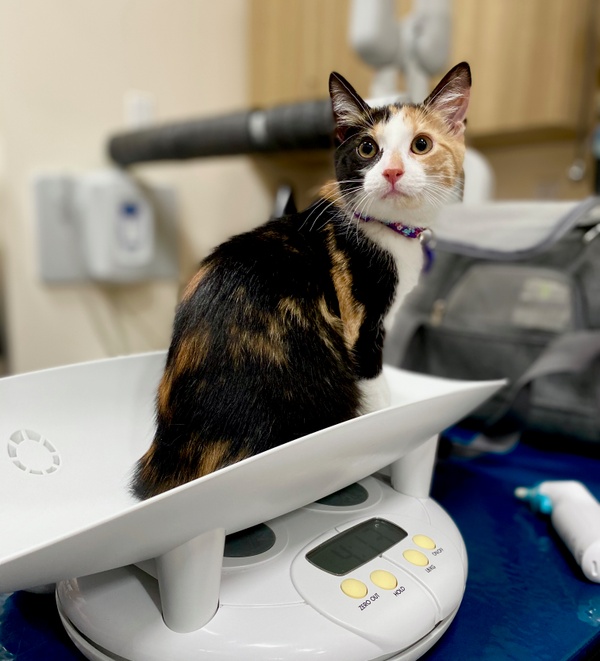
Your Cat’s Weight: A Hands On Guide for Pet Parents
A cat’s weight can both be an indicator of health and directly affect health.
And, since cats tend to be secretive creatures (they often try to hide their symptoms if they’re not feeling well) a change in weight may help you detect a health problem early before the condition progresses.
Read on to learn why it’s important to monitor your cat for weight loss or obesity and how to do so.
What’s a healthy weight for my cat?
To determine if a cat may be overweight or underweight, most veterinarians use a system called the Body Condition Score (BCS).
This cat weight chart doesn’t use numbers on a scale, but instead looks at your cat’s appearance and how they feel when you pet them. You can do it yourself at home, too.
Here’s how it works.
- Observe your cat from the side and from above while they’re standing. Then gently run your hands over their ribs and their back.
- If your cat is at an ideal weight, they should have a natural waist when viewed from above or from the side. A tummy that sticks out beyond the rib cage could mean the pet is overweight. Also, the ribs don’t stick out when observing your cat (which could mean they’re too thin).
- Additionally, you should be able to feel their ribs when you run your hand over them (if you can’t, a “fat cushion” between the skin and the ribs may be to blame).
SEE ALSO: Kitten Growth: What You Need to Know
The BCS is a great way to determine whether your cat needs to lose or gain weight, especially when confirmed by your veterinarian.
What can I do if my cat underweight?
First, it’s important to determine if there’s a medical cause — especially if your kitty suddenly lost weight, or if a thin weight is accompanied by symptoms of illness.
For example, a tooth problem could be causing decreased food intake, and it needs to be addressed by your vet. For senior cats, conditions such as kidney disease or thyroid imbalance may cause weight loss with age.
If you are currently treating your cat for a chronic health condition and they aren’t maintaining their weight, talk to your vet to see if an appetite stimulant may help.
If your cat is otherwise healthy but underweight, they may need to increase their food intake or switch to a different type of food. Ask your vet for a recommendation based on your pet’s individual needs.
How can I help my overweight cat?
Just like with underweight cats, it’s important to rule out an underlying medical condition if your cat is overweight or obese.
While hormonal conditions that cause weight gain are far less common in cats than in dogs, it does still happen. Also, certain medical conditions may cause the abdomen to have a distended appearance, which may be confused with true weight gain.
Keeping your kitty at their ideal weight is necessary for their overall health. Even just a couple of extra pounds can put your cat at a health risk. Type II diabetes (insulin resistance) is common in obese cats, and excess weight puts pressure on the joints and other organs, leading to arthritis or other health problems.
If a medical condition is ruled out, talk to your vet about a plan for food and exercise, which may include the following:
- Cut out treats and table scraps (or at least replace them with healthier options — ask your vet for kitty-safe recommendations).
- Consider switching from dry food to wet food, which tends to be more nutrient dense.
- You may need to restrict your cat’s food intake. But over-restricting can lead to nutrient deficiencies, so your vet may recommend switching to a cat weight loss food instead (which balances nutrients at a lower calorie density, while also helping to manage hunger). Sudden food restriction in an overweight cat can also lead to a liver problem called hepatic lipidosis, which can be fatal without treatment (treatment often takes several weeks). So it’s important to follow your vet’s recommendations for feeding and a safe weight loss rate.
- Use a puzzle feeder to distribute food slowly while keeping your pet entertained.
- Begin your kitty’s exercise plan slowly to avoid injuries or overexertion. Try using a laser pointer or dragging a string toy around the home as your cat chases after you.
By learning about your cat’s weight, you’ve taken an important step toward monitoring your cat’s health at home.
Helping your kitty maintain their weight is beneficial to their wellbeing, so you can keep your furry friend as healthy as possible for years to come.
SEE ALSO: Why Your Cat Is Throwing Up